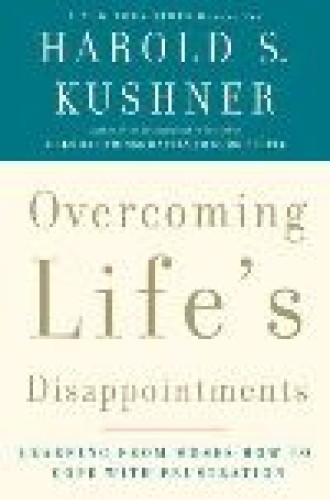Overcoming Life's Disappointments
Joy and gratitude are the subjects of many popular books. There are workshops on grief and anger and a library of literature on depression. And yet disappointment sits in the corner, a much neglected feeling. This neglect is surprising given that there is so much potential for disappointment in the United States. After all, Americans are always harping on the signal importance of having a dream about your future self. Many of these dreams must be deferred, and many turn into train wrecks. Then comes the question of how to live with the knowledge that you are not going to become the self that you had your heart set on becoming. This scenario of being stuck, of being a self that you would really prefer to be rid of, is Kierkegaard’s formula for despair, and it also serves as a fair portrait of profound disappointment, the subject of Harold Kushner’s study.
Kushner has never been one to duck difficult existential problems. His other books include When Bad Things Happen to Good People, When All You’ve Ever Wanted Isn’t Enough and How Good Do We Have to Be? A New Understanding of Guilt and Forgiveness. In this slim and highly readable volume, Kushner, a rabbi and first-rate raconteur, counsels that when it comes to disappointment, we should do what Moses did.
Moses, of courses, suffered many setbacks, not the least of which was coming down from Mount Sinai to find his people once again worshiping an idol. Later Moses would learn that he himself would never make it to the Promised Land. But no matter what, Moses persevered.
Kushner writes, “Will we, like Moses, be able to hear the commanding voice of God in the bleakest of surroundings, summoning us to be more than we ever thought we could and promising to be with us as we try to do that? And will we, like Moses, have the devotion to pick up the broken pieces of our most cherished dreams and carry them with us as we face our future?”
Like Kierkegaard, Kushner believes that our duty to God is what will prevent us from sinking beneath the waves of our own pain. However, for every duty there is a corresponding temptation, and with severe disappointment the temptation is to feel less than devoted to God, who it may seem does not offer basic protection. Having lost a child, Kushner himself must be familiar with this temptation. Drawing on that experience and current research, he comments, “Most people are more resilient than we could have expected them to be.” They show “an amazing capacity for emotional healing.”
Kushner, who has spent many hours doing pastoral counseling, credits the Creator with our ability to bounce back, and he adds, “The same God who plants the blessing of resilience within us blesses the people around us with the gift of compassion.” As this book’s prescription goes, the broken-hearted should open themselves up to others by forming friendships and participating in support groups. In the process, they will come to experience the healing effects of the love of others, and to grasp that they have not been singled out in their affliction.
This meditation is rich with positive and negative object lessons. There are also straightforward insights—such as the claim that a sense of humility is essential to keeping disappointments in perspective. One man comes to Kushner bemoaning his daughter’s divorce and complains, “How could this happen to me?” But of course, it’s happening not to him but to his daughter. I have caught myself moaning “Why me?” upon the illness and death of loved ones. Kushner is right to instruct that when we fall into one of those ruts, we have a responsibility to struggle against our own narcissism.
Unlike some of the virtuosi of denial and rooftop proclaimers of the power of positive thinking, Kushner does not downplay the force of the blows that life can deliver. But for all of his epiphanies, he has blind spots as well.
Though Kushner sighs that he wishes he had spent more time with his own children, there is one species of disappointment that he does not much focus on, namely moral self-disappointment. Defeats of this type can be the most devastating because they can sap us of the confidence that we have the mettle to do the right thing. Once our confidence has vanished, we are on an express track to additional moral defeats. On this score, Kushner’s reliance on the Old Testament limits his vision, for one of the most powerful stories in the Bible is that of Peter, the Rock, denying Jesus three times. Peter amazingly does not give up on himself, but instead goes on to be crucified for his Lord.
Kushner is careful to warn us about becoming too obsessed with our worldly goals. Nevertheless, he seems to have bought into the dream ideology promulgated by every American politician and advertising firm. He casts Moses as, of all things, “the man who dared to dream.” There is no doubt that dreams and ambitions can spur us on to great accomplishments. However, they also reveal an orientation toward the future that may prevent us from ever being fully present in the moment—as though there were no today without tomorrow. If we find our identity in some down-the-road picture of ourselves, what is to become of us when we grow old and our worldly tomorrow is but decrepitude and death? More fundamental yet, those who do not believe in the mansions of eternity would have a point in thinking that we simply struggle and die, and thus that life itself is ultimately disappointing. Kushner’s wise and good-hearted reflection does not speak to those who, because of disappointment or disposition, cannot keep the faith that life is good.






